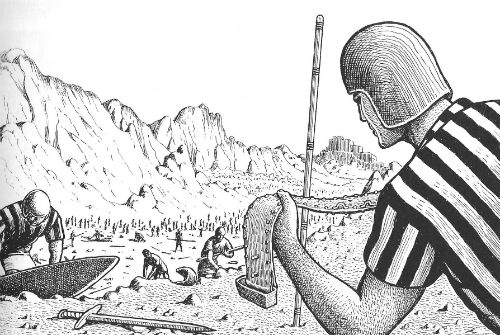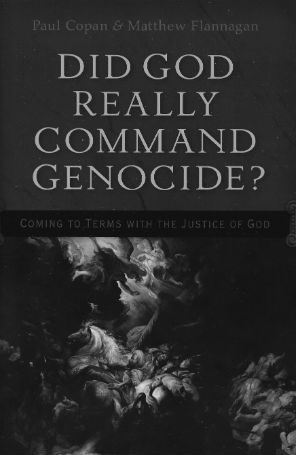Did God Command Holy War?
By Neil Earle
 Israel was often at the mercy of rapacious warring tribes and stronger nations.
Israel was often at the mercy of rapacious warring tribes and stronger nations.
At a conference on Preaching Peace in Toronto, Ontario, Dr. Patricia Dutcher-Wells of the Vancouver School of Theology raised the vital subject of the “violence of God,” a Biblical phenomenon we see showing up in the Old Testament.
She referred to specific texts that have always bothered people about the Bible – especially God’s commands to exterminate various Canaanite tribes in Deuteronomy 20:10-18 and the order to King Saul to “utterly destroy” the Amalakites in 1 Samuel 15:3.
In the light of Islamic extremists claiming to commit acts of terror in the name of Allah and the Koran, Christian teachers have been taking some “hits” in recent times about these OT passages especially. Someof the “New Atheists” go so far as to blame religious belief for sanctioning the spirit of venegance and hostility.
But the issue of God as the source of violence has always been troublesome for Christians who more deeply contemplate their sacred scripture.
As Professor Dutcher-Wells said, “it is almost like God took an anger management course in the period between the Old and new Testaments.” It is also a well-known fact that many Christian counselors dealing with victims of abuse and/or refugees from war-torn areas have tried to avoid these texts and not face the implications. It is a matter of “harm reduction” says Professor Dutcher-Wells for the Bible’s many sensitive readers.
In fewer fields does it require Christian teachers to be both honest with the text and sensitive to the questions that come in to us from the public square.
The Era of Warrior Gods
As a noted Biblical scholar, Professor Dutcher-Wells stresses first the matter of context. Indeed context above all. She pays attention to ftting these “extermination texts” into the wider framework of the whole of Scripture. Both the Old and New Testaments reveal God to be a being of love and justice. We start with Jesus and work backwards as a way to achieve God’s full mind on a subject some have advised.
In this context, what is the the Old Testament? Largely it is the faithful narrative of God’s interaction with his people in a Bronze Age and Iron Age context. The Gods of the nations were usually Warrior Gods and conquest was often carried out in the name of Mars or various city gods, Moloch or Athena to name some of the more well-known. This is an important first point: God gave his word to Israel in the context of a very different age when violence was prevalent as way of settling disputes and where punishment was fierce and often brutal. Even the much discussed Code of Hammurabi prescribed death penalties for offenses we would not legislate for today.
Hence the colorful sometime even hyperbolic language all through the Old Testament about Yahweh, the God of Israel, being a Man of War, the Lord of battles – the One who stood up for the defense and liberation of his people in an often hostile environment.
By comparison, few today question the justice evidenced in the Allied armies liberating the Nazi concentration camps in World War Two. The Old Testament is often giving us a roughly parallel situation. One has only to remember Israel’s national origins as a slave nation in Egypt where cruel oppression and the threat of genocide loomed large, as with the Pharoah of Egypt (Exodus 1).
Yahweh revealed himself to an outnumbered nation trying to survive in a dire situation of aggressive nations and rapacious desert tribes. He is portrayed in many Old Testament texts as Israel’s Champion, a military deliverer, a claim guaranteed to get them to listen to him in times of distress. Israel’s existence was a vital part of God’s preparatory work for the full salvation of the human race. So often we read about him intervening on Israel’s behalf “for his name’s sake.”
Along with this was his numerous appearances in the text as the champion of the oppressed and on the side of the orphans and widows, a striking emphasis in such a time (Psalm 68). “Violence,” said the professor “is often God acting to protect people, sometimes as lessons in sovereignty, showing who is really in charge of the nations.”
 Copan and Flannagan's study is a good introduction to this cruciual subject.
Copan and Flannagan's study is a good introduction to this cruciual subject.Commands and Exceptions
Paul Copan and Matthew Flannagan follow up on these specific points in their comprehensive study Did God Really Command Genocide? Coming to terms with the Justice of God. They make the point that there are many major exceptions dotting the Hebrew text. On Israel’s conquering march through the wilderness to Canaan, they were told not to meddle with related peoples such as Moab and Ammon. There was the notable case of Rahab the innkeeper in Jericho whose family was spared in the siege of Jericho. Israel later made treaties with the Gibeonites from Canaan.
In context, “the Israelites were refugees,” says Copan and Flannagan, “who had faced hundreds of years of oppression and now needed a place in which to live.” Also the Canaanite tribes singled out for expulsion were hardly innocent victims. “The kinds of wicked acts (Deuteronomy 9:4-5) the Canaanites engaged in were not trivial: incest, adultery, bestiality, ritual prostitution, homosexual acts, and most significantly, child sacrifice (Leviticus 18; Deuteronomy 12:29-31). Most of these acts were illegal even in modern Western nations.”
The Canaanite tribes singled out for removal – and the commands to “drive them out” outnumber the “extermination decrees” by 3 to 1 – were against national groups allowed hundreds of years to change their ways before divine judgment fell upon them. And also, not incidentally, the Israelites themselves were told they too would be expelled if they took up these practices – which they were!
Israel’s own occupation of the land was conditional; Israel too would be ‘utterly destroyed’ if engaged in the defiling practices of the Canaanites (Leviticus 18:25-28). Which is what happened.
God’s Police Force
Sometimes ancient Israel was appointed at certain selected times as God’s police force, an imperative we see repeated in the New Testament. In Romans 13. St. Paul taught the Roman church to respect the authorities, and police officials are called “the ministers of God.” It was the Roman army that did police duty in the first century. It is also good to remember that the emperor whom Paul referenced for prayer was the infamous Nero (1 Timothy 2:1-3).
So the issue is indeed complex, much more complicated than is normally thought in watching glib emotionalized public debates, especially on television.
Compared to the unending calls to Holy war in the Koran – as Copan, Flannagan and many have shown – the Old Testament texts are limited to a certain time (the Conquest), a certain place (Iron Age Palestine) and limited to properly constituted authority whether that of Moses, Joshua or King Saul.
Later on, the Biblical hero David was condemned by God for spilling too much blood. He was forbidden to build the Temple that he had set his heart on. Here as so often in the Old Testament we begin to intuit the overall intention of the living God who led Israel to tone down the violence, even to moderate punishment, to move towards more humane and just solutions. The “forty stripes” in Deuteronomy 5:3, for example, were inscribed to judges so as not to exceed that amount.
Even the notorious “eye for eye” principle in the Law did not literally mean what it said, as the full text clearly shows (Exodus 21:24).
With this important issue as in all others involving such an ancient venerable text as the Bible, there is a glaring need to assemble all the texts on a given matter to “judge right judgment.” There is much more to discuss in terms of the later Crusades in Christian history, just war theory and Jesus’ own provocative actions in the cleansing of the Temple to which we will devote more articles. After all, none other but a careful, sustained, respectful approach would fit such a powerful, wide-ranging and inspired document as the Holy Bible.